The Link Between Low Energy and Procrastination: Can Supplements Help?
Introduction
We’ve all had those days where motivation feels out of reach. You sit down to start an important task, but your body feels heavy, your mind foggy, and every cell in your body whispers, “Not now.” You check your phone, make coffee, and suddenly an hour has disappeared. The cycle of guilt and avoidance begins.
While we often blame procrastination on poor time management or laziness, research shows something deeper at play: low physical and mental energy. When your brain and body are drained, it’s not that you don’t want to work—it’s that your nervous system literally doesn’t have the resources to start.
And this lack of energy isn’t just about willpower—it’s biochemical. It involves neurotransmitters like dopamine, cellular energy molecules like ATP, and hormones that regulate focus, motivation, and mood.
In this 3000-word guide, we’ll unpack the real science behind low energy and procrastination, and explore how lifestyle strategies and supplements can help you restore focus, rebuild motivation, and reclaim your productivity.
Looking for supplements for This? Click here.
Why Procrastination Is Often an Energy Problem ⚡
Most people think procrastination is a psychological issue—a failure of discipline or organization. But procrastination is actually a symptom of an underlying energy-management problem.
Your brain is an energy-hungry organ, consuming about 20% of your daily calories. Every act of focus, planning, and decision-making burns glucose and relies on ATP (adenosine triphosphate), your cells’ energy currency.
When your energy reserves are low—due to poor sleep, nutrient deficiencies, chronic stress, or blood sugar fluctuations—your prefrontal cortex (the part responsible for reasoning, planning, and self-control) slows down. Meanwhile, your limbic system (responsible for emotional regulation and immediate reward) takes over.
That’s when procrastination happens: your brain prioritizes short-term comfort (scrolling, snacks, distractions) over long-term effort.
Common Signs of Energy-Related Procrastination:
Feeling tired even after sleeping
Struggling to start tasks despite caring about them
Brain fog or difficulty focusing
Mood swings and irritability
Relying on caffeine for basic motivation
A “wired but tired” feeling at night
If that sounds familiar, your procrastination likely stems from low cellular or neurotransmitter energy—not laziness.
The Neurochemistry of Motivation 🧠

To understand why low energy sabotages motivation, let’s look at your brain’s reward and focus circuits.
At the center of these systems lies dopamine, a neurotransmitter that drives your sense of anticipation, pleasure, and reward. Dopamine is what makes you feel excited to start something—and satisfied when you make progress.
But dopamine doesn’t work alone. It interacts with other systems:
Norepinephrine: Provides alertness and attention.
Acetylcholine: Supports learning and memory.
Serotonin: Stabilizes mood and emotional balance.
When your brain lacks the nutrients or energy to produce these chemicals, tasks lose their spark. You know what to do, but you can’t feel the motivation to begin.
How Energy Deficits Affect Motivation:
Low dopamine: You can’t feel the “reward anticipation” that drives action.
Low acetylcholine: Focus and task persistence suffer.
Low ATP (cellular energy): Neurons fire less efficiently, making mental effort feel exhausting.
High cortisol: Chronic stress drains dopamine and magnesium, worsening fatigue.
In short, procrastination often begins where energy and neurochemistry meet.
Why You Feel Drained: Root Causes of Low Energy 🔋
If you constantly feel too tired to focus, there are likely several factors depleting your energy reserves.
Chronic Stress
Stress floods the body with cortisol and adrenaline. Initially, this boosts alertness—but over time, it drains magnesium, B vitamins, and dopamine levels. The result: burnout, irritability, and fatigue.
Poor Sleep Quality
Sleep is when your brain restores neurotransmitters, consolidates memories, and resets hormonal rhythms. Even mild sleep deprivation disrupts glucose metabolism and reduces mitochondrial function, making it harder to think clearly.
Nutrient Deficiencies
Many nutrients power your brain’s energy production. A lack of B vitamins, magnesium, iron, or CoQ10 reduces ATP synthesis, leaving your brain literally “low on battery.”
Blood Sugar Fluctuations
Skipping meals or eating high-sugar foods causes glucose spikes followed by crashes. Since your brain runs primarily on glucose, these dips can trigger procrastination, irritability, and poor focus.
Sedentary Lifestyle
Physical movement increases oxygen flow, mitochondrial activity, and dopamine sensitivity. Too much sitting lowers your baseline energy and motivation.
Digital Overstimulation
Constant phone scrolling floods the brain with dopamine spikes, desensitizing your reward system. Over time, real-world tasks feel dull compared to instant online gratification.
Understanding which factors are draining your energy helps you address procrastination at its root.
The Energy-Procrastination Loop 🔄
Here’s how the cycle typically looks:
Low energy → You feel tired or overwhelmed.
Avoidance → You put off the task to relieve discomfort.
Temporary relief → Dopamine spike from distractions.
Guilt and stress → Cortisol increases, draining energy further.
Reinforced habit → The brain learns to seek avoidance when stressed.
Breaking this cycle requires not just willpower—but biochemical support. This is where lifestyle optimization and supplements come in.
Nutritional Foundations for Energy and Focus 🍎
Before reaching for supplements, it’s essential to support your baseline energy metabolism through food and hydration.
Eat for Steady Energy
Protein: Provides amino acids for neurotransmitters (dopamine, norepinephrine). Aim for 20–30g per meal.
Healthy fats: Support brain structure (omega-3s, olive oil, avocado).
Complex carbs: Stabilize blood sugar (sweet potatoes, oats, quinoa).
Micronutrients: Load up on leafy greens, nuts, seeds, and colorful vegetables for B vitamins and magnesium.
Hydration
Even mild dehydration can reduce focus by 20%. Drink water regularly, especially during mentally demanding tasks.
Supplements That May Help Boost Energy and Motivation 🌿💊
When diet, rest, and stress management aren’t enough, targeted supplementation can help restore energy production and neurotransmitter balance. Below are the most effective, research-backed options.
CoQ10 (Coenzyme Q10): The Mitochondrial Spark Plug ⚙️
What it does:
CoQ10 is essential for producing ATP in your cells. It acts like a spark plug for mitochondrial energy metabolism.
Why it helps procrastination:
Low ATP = mental fatigue. CoQ10 supports sustained energy and protects brain cells from oxidative stress.
Benefits:
Increases mental and physical stamina
Reduces fatigue
Enhances mitochondrial resilience
Typical dose: 100–200 mg daily with food (preferably with fats).
Acetyl-L-Carnitine (ALCAR): Brain Fuel for Focus 🔥
What it does:
ALCAR transports fatty acids into mitochondria to be used for energy. It also supports acetylcholine and dopamine synthesis.
Why it helps:
It enhances alertness and focus, helping you “kickstart” your brain into action.
Benefits:
Boosts mental energy and motivation
Supports dopamine balance
Protects neurons from fatigue-induced stress
Typical dose: 500–1,000 mg daily in the morning.
B Vitamins: The Energy Catalysts 💛
What they do:
B vitamins are co-factors in nearly every energy-producing reaction in your body. Deficiency leads to sluggish metabolism and poor neurotransmitter synthesis.
Why they help:
They’re essential for dopamine, serotonin, and energy metabolism—making them foundational for fighting procrastination.
Benefits:
Improves cognitive clarity
Reduces stress and fatigue
Enhances neurotransmitter function
Typical dose: A high-quality B-complex supplement providing at least 10–25 mg of each major B vitamin.
Magnesium: The Calm Energy Mineral 🌙
What it does:
Magnesium regulates over 300 enzymatic reactions, including ATP production and dopamine signaling.
Why it helps:
It reduces stress-induced fatigue and calms the nervous system while maintaining steady energy.
Benefits:
Reduces tension and restlessness
Improves sleep and recovery
Enhances mental focus
Typical dose: 200–400 mg daily (glycinate or threonate forms are best for the brain).
Rhodiola Rosea: The Anti-Burnout Adaptogen 🌿
What it does:
Rhodiola balances cortisol, boosts mental endurance, and increases dopamine receptor sensitivity.
Why it helps:
It helps you perform under stress without crashing afterward—a key benefit for chronic procrastinators battling fatigue and anxiety.
Benefits:
Reduces mental exhaustion
Improves focus and mood
Increases motivation and stress resilience
Typical dose: 200–400 mg standardized to 3% rosavins and 1% salidroside.
Looking for supplements for This? Click here.
L-Tyrosine: The Dopamine Precursor ⚡
What it does:
L-Tyrosine is an amino acid that the brain converts into dopamine and norepinephrine.
Why it helps:
When you’re stressed or fatigued, your brain burns through tyrosine quickly. Supplementing restores dopamine synthesis and focus.
Benefits:
Boosts alertness under stress
Supports motivation
Reduces “mental block” during pressure
Typical dose: 500–1,500 mg in the morning or before mentally demanding tasks.
Omega-3 Fatty Acids: Neuronal Nutrition 🐟
What they do:
Omega-3s (EPA & DHA) make up the building blocks of brain cells and regulate dopamine signaling.
Why they help:
They improve dopamine receptor sensitivity and membrane fluidity—helping your brain fire signals efficiently.
Benefits:
Improves focus and emotional stability
Reduces inflammation-related fatigue
Supports long-term brain health
Typical dose: 1,000–2,000 mg combined EPA/DHA daily.
NAD+ Precursors (Niacinamide Riboside or NMN) 🔋
What they do:
NAD+ is a coenzyme crucial for mitochondrial energy production. It declines with stress and age.
Why they help:
By supporting mitochondrial efficiency, NAD+ boosters increase both physical and cognitive stamina.
Benefits:
Boosts ATP production
Enhances alertness
Supports cellular repair
Typical dose: 250–500 mg daily of NR or NMN, taken in the morning.
Adaptogens (Ashwagandha, Ginseng, Eleuthero) 🌱
What they do:
Adaptogens help your body adapt to stress and restore hormonal balance.
Why they help:
They stabilize cortisol, reduce burnout, and boost dopamine balance—all critical for consistent motivation.
Benefits:
Increases resilience and focus
Reduces anxiety-related procrastination
Improves overall vitality
Typical dose:
Ashwagandha: 300–500 mg daily
Ginseng: 200–400 mg daily
Eleuthero: 300 mg twice daily
Iron and Ferritin (for Low Energy in Women)
What they do:
Iron carries oxygen to the brain and muscles. Low ferritin (stored iron) can cause fatigue, brain fog, and low mood.
Why it helps:
Restoring iron supports energy metabolism and improves cognitive alertness.
Typical dose: Based on bloodwork (consult your doctor before supplementing).
Looking for supplements for This? Click here.
Mind-Body Practices That Support Energy and Motivation 🧘
Supplements work best when combined with habits that regulate your nervous system and restore balance.
Morning Sunlight
Natural light in the morning regulates circadian rhythm and boosts dopamine naturally.
Movement as Medicine
Even 10–15 minutes of daily movement (walking, stretching, or bodyweight exercise) increases dopamine sensitivity and oxygen delivery.
Breathwork for Mental Reset
Slow, diaphragmatic breathing lowers cortisol and rebalances your energy. Try 4-7-8 breathing: inhale for 4 seconds, hold for 7, exhale for 8.
Want to try Breathwork? Click Here.
Digital Boundaries
Limit dopamine-draining habits like endless scrolling or multitasking. Replace them with single-task focus windows.
Structured Rest
Alternating deep work with true rest prevents burnout. Use techniques like the Pomodoro Method (25 minutes work, 5 minutes rest).
When to Seek Help: Chronic Fatigue or Burnout ⚠️
If low energy and procrastination persist despite good sleep and nutrition, you may be dealing with deeper issues such as:
Thyroid imbalance
Iron deficiency anemia
Chronic fatigue syndrome
Adrenal dysfunction
Major depressive disorder
Consult a healthcare professional for lab testing. Supplements can support, but medical guidance ensures the right approach.
Rewiring the Brain for Consistent Energy 🌿
Breaking free from energy-related procrastination is not about “pushing harder.” It’s about working smarter—restoring the chemistry that allows motivation to flow.
Here’s the blueprint:
Refuel your mitochondria with nutrients like CoQ10, B vitamins, and magnesium.
Balance dopamine with tyrosine, omega-3s, and adaptogens.
Regulate cortisol with ashwagandha, rhodiola, and mindfulness.
Train focus gently. Start small, reward progress, and rebuild momentum gradually.
When your body and brain feel nourished, procrastination fades—not because you “try harder,” but because energy and focus become effortless again.
The Takeaway 🌟
Procrastination is not a flaw—it’s a feedback mechanism. Your body is telling you that your energy systems, neurotransmitters, or stress response need support.
The key to overcoming it lies not in shame or hustle culture, but in restoring balance. When your cells have energy and your brain’s dopamine system is nourished, the drive to act returns naturally.
Through proper nutrition, rest, and smart supplementation, you can reconnect with the part of yourself that wants to take action—not out of pressure, but from genuine vitality.
Because productivity isn’t about forcing effort—it’s about building the biological foundation for sustainable energy, motivation, and peace of mind. 🌿💛
Looking for online therapy ? Click Here.
References 📚
Salamone, J. D., & Correa, M. (2012). The mysterious motivational functions of mesolimbic dopamine. Neuron.
Wurtman, R. J., & Cansev, M. (2011). Nutritional support for neurotransmitter synthesis and mental performance. Nature Reviews Neuroscience.
Arnsten, A. F. T. (2009). Stress signaling pathways that impair prefrontal cortex structure and function. Nature Reviews Neuroscience.
Benton, D., et al. (2001). B vitamins and energy metabolism in the brain. Nutritional Neuroscience.
Panossian, A., & Wikman, G. (2010). Adaptogens in stress and fatigue: regulation of homeostasis through mechanisms of action. Phytomedicine.
Kennedy, D. O. (2016). Cognitive function, brain energy, and nutritional influences. Nutrition Reviews.
Volkow, N. D., et al. (2011). Dopamine and the brain’s reward circuitry in motivation and addiction. American Journal of Psychiatry.
Peirson, S. N., & Foster, R. G. (2014). Sleep and dopamine regulation in cognition and emotion. Trends in Neurosciences.
Lieberman, H. R. (2003). Tyrosine and stress: human performance and neuroendocrine function. Military Medicine.
Smith, J. V., & Luo, Y. (2004). Mitochondrial support nutrients for cognitive vitality. Neurosignals.
Related Posts
-

Why Co-Dependency Feels Draining: Adrenal Fatigue and Supplements That Help
The adrenal glands are small but powerful organs that sit above your kidneys, acting as your body’s built-in stress managers. They produce hormones like cortisol and adrenaline that help regulate energy, mood, and resilience. When they’re overworked from chronic stress or emotional exhaustion, fatigue and imbalance follow. Supporting adrenal health naturally can help restore calm, energy, and hormonal balance. 🌿⚡
-

The Link Between Anxiety, Co-Dependency, and Natural Support
Anxiety feels like living in constant alert mode—your heart races, your thoughts loop, and your body can’t find peace. It’s the nervous system’s way of preparing for danger, even when none exists. Understanding what’s happening in your mind and body is the first step toward calming the storm and restoring balance. 🌿💫
-

Supplements That Support Dopamine and Serotonin in Co-Dependent Patterns
Serotonin is the neurotransmitter of calm, confidence, and contentment. When it’s balanced, you feel peaceful and emotionally grounded. When it’s low, anxiety, mood swings, and emotional dependence take over. By understanding serotonin’s role in emotional health—and how to support it naturally—you can rebuild inner stability, improve relationships, and cultivate lasting happiness from within. 🌞💫
-

How Emotional Exhaustion in Codependency Impacts the Nervous System
The nervous system is the body’s communication network, connecting the brain to every organ and muscle. It regulates stress, mood, and emotion through a delicate balance of electrical and chemical signals. When overwhelmed, it can become dysregulated—leading to fatigue, anxiety, and emotional imbalance. Understanding how to calm and strengthen the nervous system is key to healing from chronic stress and emotional burnout. ⚡🌿
-

What Is Co-Dependency? The Role of Brain Chemistry and Stress
Stress is more than a feeling—it’s a full-body experience that begins in the brain and ripples through every cell. When cortisol surges and the nervous system stays on alert, your body can’t rest or recover. Over time, this constant tension affects energy, focus, mood, and even immune health. Understanding stress chemistry is the first step toward breaking free from burnout and finding calm again. 🌿
-

Creating a Supplement Stack for Motivation, Energy, and Anti-Procrastination
Motivation is the fuel behind every meaningful achievement—but it’s not just about willpower. It’s a mix of mindset, brain chemistry, and momentum. When energy, focus, and purpose align, action feels natural instead of forced. Learn how to harness motivation as a daily state, not a fleeting feeling.
-

Supplements for Building Consistency and Reducing Chronic Procrastination
Biochemistry is the bridge between biology and chemistry—the science of life at the molecular level. It explains how nutrients, hormones, and neurotransmitters interact to create energy, thought, and emotion. From brain function to muscle movement, biochemistry reveals the invisible processes that sustain health, balance, and vitality.
-

GABA and Procrastination: Supporting Calm Focus for Productivity
GABA is the brain’s natural calming messenger—a neurotransmitter that helps slow mental overactivity and ease stress. When GABA levels drop, focus fades, anxiety rises, and procrastination becomes more likely. By supporting GABA through nutrition, lifestyle, and supplements, you can restore calm clarity, improve focus, and take action with steady, balanced energy.
-

Ashwagandha and Procrastination: Lowering Stress to Improve Action
Science is the language of curiosity and discovery. It helps us understand the hidden patterns behind life, energy, and the universe. Through experimentation and critical thinking, science connects imagination to evidence—turning questions into knowledge. Whether through microscopes, molecules, or minds at work, science represents our endless pursuit of truth and innovation.
-

Neurotransmitters and Motivation: Supplements That Support Drive and Focus
Supplements can do more than boost physical health—they can also enhance mental clarity, focus, and motivation. Nutrients like omega-3s, magnesium, B vitamins, and adaptogens help balance neurotransmitters, stabilize mood, and support brain energy. When combined with good sleep, nutrition, and mindful habits, they can transform how your brain performs under stress.
-

How Stress Hormones Like Cortisol Fuel Procrastination (and What Helps)
Blood sugar isn’t just about physical health—it directly impacts focus, mood, and motivation. When glucose levels spike and crash, energy and attention do the same, fueling procrastination and brain fog. Learning how to stabilize blood sugar through balanced meals, mindful habits, and key nutrients helps keep your mind steady, focused, and ready to act.
-

Brain Fog and Procrastination: Supplements for Mental Clarity
Brain fog can turn even simple tasks into mental hurdles. When your thoughts feel slow and unclear, procrastination often follows—making focus and productivity seem impossible. This article explores the biochemical and lifestyle causes of brain fog and reveals the most effective supplements for restoring mental clarity, focus, and sustained energy.
-

Why Do We Procrastinate? The Role of Dopamine and Supplements That Support It
Dopamine is the brain’s motivation messenger—the chemical that fuels focus, reward, and drive. When dopamine levels drop, even simple tasks can feel impossible to start. This article explores how dopamine shapes procrastination, motivation, and mental energy, along with natural supplements and daily habits that help restore balance and get things done.
-

Phosphatidylserine and Stress Reduction for People with BDD
Stress is more than a mental state—it’s a full-body experience that affects hormones, brain chemistry, and emotional balance. For people with Body Dysmorphic Disorder (BDD), constant tension and worry about appearance can overload the nervous system. Learning how stress works and finding ways to calm it is key to breaking the cycle of anxiety and self-criticism.
-

How Antioxidants Like Vitamin C & E Support Mental Health in BDD
Antioxidants are the body’s natural defense against stress and inflammation. For people with Body Dysmorphic Disorder (BDD), oxidative stress can worsen fatigue, anxiety, and emotional imbalance. Nutrients like Vitamin C and E help protect brain cells, boost neurotransmitter function, and support a calmer, clearer mindset—building a stronger foundation for recovery.
-

Ginkgo Biloba and Memory Support for BDD Recovery
Emotional regulation is the foundation of healing from Body Dysmorphic Disorder (BDD). When the nervous system stays in constant overdrive, even small stressors can trigger self-critical spirals. Learning to calm emotional reactivity helps restore clarity, confidence, and a sense of inner balance. By blending mindfulness, nervous system support, and self-compassion, you can retrain your brain to respond—not react—to emotion.
-

Alpha GPC and Cognitive Function in Body Dysmorphic Disorder
Mental fatigue can feel like your brain has hit a wall—thoughts slow down, focus fades, and motivation disappears. For people with Body Dysmorphic Disorder (BDD), chronic overthinking, emotional stress, and constant self-evaluation can deplete mental energy even further. Understanding what causes this cognitive exhaustion is the first step toward recovery—through rest, balanced nutrition, and targeted brain-supporting supplements.
-

N-Acetyl L-Tyrosine and BDD: Supporting Mental Clarity
Chronic stress doesn’t just affect your mood—it reshapes your brain chemistry, weakens focus, and fuels the obsessive thought loops common in Body Dysmorphic Disorder (BDD). Over time, constant cortisol elevation drains mental energy and emotional balance. Learning to recognize and manage chronic stress is essential to restoring mental clarity, self-compassion, and resilience.
-

Chamomile and Lavender for Calming Obsessive Body Image Thoughts
The nervous system is the command center of our emotional and physical world—and in Body Dysmorphic Disorder (BDD), it often operates in overdrive. Understanding how the brain and body communicate under stress reveals why intrusive thoughts feel uncontrollable. Learning to regulate the nervous system through calm practices, nutrition, and supplements helps restore inner balance and emotional safety.
-

Adaptogens for Body Dysmorphic Disorder: Rhodiola, Ginseng, and More
Rhodiola rosea, often called the “golden root,” is an adaptogenic herb renowned for boosting stress resilience and mental endurance. For individuals with Body Dysmorphic Disorder (BDD), Rhodiola may help reduce fatigue, regulate cortisol, and enhance emotional balance. By supporting both mind and body, this powerful plant promotes calm focus, improved mood, and renewed energy to face daily challenges.
-

B Vitamins for Stress Resilience in BDD: Rebuilding Calm from Within
Biochemistry is at the heart of every thought, emotion, and reaction we experience. In Body Dysmorphic Disorder (BDD), chemical imbalances in neurotransmitters like serotonin, dopamine, and GABA can amplify stress and distort self-perception. Understanding the biochemistry behind mood and stress regulation offers a path toward healing—bridging the gap between emotional experience and the body’s molecular balance.
-

Melatonin and Body Dysmorphic Disorder: Restoring Healthy Sleep Patterns
Melatonin, the body’s natural sleep hormone, plays a vital role in helping people with Body Dysmorphic Disorder (BDD) restore healthy sleep cycles. When anxiety and obsessive thinking interfere with rest, melatonin levels often drop, leading to more emotional reactivity and distorted self-perception. This article explores how melatonin works, why BDD disrupts it, and how natural supplementation—combined with mindful routines—can help the brain and body finally find calm at night.
-

Sleep Struggles with BDD: Supplements for Rest and Recovery
When you’re living with Body Dysmorphic Disorder (BDD), restful sleep can feel impossible—but the right supplements can help reset your body’s natural rhythm. From magnesium and L-theanine to 5-HTP and ashwagandha, these nutrients support relaxation, lower cortisol, and enhance melatonin production. This article explores how supplements can calm the mind, ease nighttime anxiety, and promote true restorative sleep for emotional and physical recovery.
-

5-HTP and Serotonin Balance: Could It Help with Body Dysmorphic Disorder?
Anxiety can feel like a storm inside the mind—restless, overwhelming, and hard to control. In people with Body Dysmorphic Disorder (BDD), anxiety often fuels obsessive thoughts and self-criticism, creating a painful cycle of worry and self-doubt. This article explores the biological roots of anxiety, the role of neurotransmitters like serotonin and GABA, and how natural strategies such as mindfulness, supplements, and nervous system regulation can restore calm and mental clarity.
-

Can Ashwagandha Help Ease Stress and Anxiety in Body Dysmorphic Disorder?
Neurotransmitters like serotonin, dopamine, GABA, and acetylcholine are the chemical messengers that shape how we think, feel, and react to stress. In Body Dysmorphic Disorder (BDD), imbalances in these neurotransmitters can amplify anxiety, obsessive thinking, and emotional distress. This article explores how restoring healthy brain chemistry through nutrition, supplements, and mindfulness can help bring clarity, calm, and emotional stability.
-

L-Theanine for BDD: Finding Calm in the Mind
Neurochemistry plays a central role in how we think, feel, and see ourselves. For those living with Body Dysmorphic Disorder (BDD), imbalances in neurotransmitters like serotonin, dopamine, and GABA can intensify anxiety, obsessive thoughts, and emotional distress. This article explores how regulating brain chemistry through supplements, mindfulness, and lifestyle changes can bring the nervous system back into harmony and restore inner calm.
-

Omega-3 Fatty Acids and Body Image Disorders: Supporting Emotional Health
Omega-3 fatty acids do far more than support heart health—they nourish the brain, stabilize mood, and may ease the emotional turbulence tied to body image disorders like BDD. This in-depth article explores how omega-3s regulate serotonin, dopamine, and inflammation, helping individuals reduce obsessive thoughts and rebuild self-acceptance. It also connects nutrition to therapy, mindfulness, and nervous system balance for holistic emotional healing.
-

Magnesium and BDD: Calming an Overactive Nervous System
Magnesium plays a crucial role in calming an overactive nervous system—something people with Body Dysmorphic Disorder (BDD) struggle with daily. This article explores how magnesium supports relaxation, emotional regulation, and stress reduction while diving into the science behind its connection to brain chemistry. It also examines how combining magnesium supplementation with therapy and breathwork can help rebalance the body’s stress response, reduce obsessive thought patterns, and promote lasting nervous system calm.
-

The Gut-Brain Axis and BDD: Why Probiotics Might Matter
The gut and brain are constantly in conversation — and that dialogue may shape how you experience Body Dysmorphic Disorder. By nurturing your microbiome with probiotics, prebiotics, and gut-healing nutrients, you can help rebalance serotonin, calm anxiety, and restore emotional stability from within 🧠🦠.
-
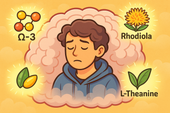
Brain Fog and Body Dysmorphic Disorder: Can Nootropic Supplements Help?
Brain fog often accompanies Body Dysmorphic Disorder, clouding focus and deepening emotional fatigue. Nootropic supplements like L-theanine, Rhodiola, and CoQ10 can help restore mental clarity, balance neurotransmitters, and bring calm energy back to the mind 🌿🧠.
-

How Stress Hormones Like Cortisol May Worsen Body Dysmorphic Disorder
Chronic stress floods the brain with cortisol — the hormone that keeps you on high alert. In Body Dysmorphic Disorder, this chemical overdrive fuels anxiety, distorts self-image, and traps the body in survival mode. Calming cortisol helps restore both peace and perspective 🌿🧠.
-

The Role of Neurotransmitters in BDD—and How Supplements May Help
Neurotransmitters like serotonin, dopamine, glutamate, and GABA shape how people with Body Dysmorphic Disorder perceive themselves. When these brain messengers fall out of balance, perception distorts — but targeted supplements can help restore calm, focus, and emotional regulation 🧠🌿.
-

What Is Body Dysmorphic Disorder? A Deeper Look at the Mind-Body Connection
Body Dysmorphic Disorder (BDD) isn’t just about appearance — it’s about perception. When brain chemistry, trauma, and stress distort self-image, the mind begins to see flaws that aren’t truly there. Healing starts by calming the nervous system and reconnecting mind and body 🪞🧠.
-
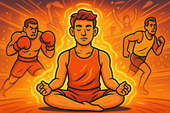
Keeping Calm in Competitive Sports: How to Train Your Mind, Body, and Chemistry for Peak Performance
Competitive pressure can overwhelm even the strongest athletes — but calm is trainable. By combining supplements like magnesium, L-theanine, and adaptogens with breathwork and mindset training, you can stay focused, balanced, and in control under any level of stress 🧠🏅.
-
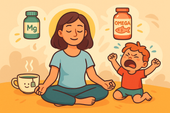
Supplements for Parents Facing Toddler Tantrums: Staying Calm When Little Emotions Run Wild
Toddler tantrums can drain even the most loving parent — but your calm is powerful. With the right supplements like magnesium, L-theanine, and ashwagandha supporting your nervous system, you can stay patient, grounded, and kind, even when emotions run high 🧸🌿.
-

Workplace Stress and Anger Management Support
Workplace stress can quickly turn into frustration — but calm is a skill you can train. By combining supplements like magnesium, L-theanine, and adaptogens with breathwork and mindset tools, you can stay focused, patient, and emotionally grounded no matter how intense the office gets 💼🌿.
-

How to Stay Patient With Family During Stressful Holidays
Holiday gatherings can stir up old stress and test your patience — but calm is possible. With nervous system support from magnesium, L-theanine, and adaptogens, plus mindful breathing and clear boundaries, you can stay centered, kind, and grounded even when family chaos unfolds 🎄💞.
-

Supplements to Keep Calm During Traffic Jams
Getting stuck in traffic doesn’t have to ruin your mood. With calming supplements like magnesium, L-theanine, and ashwagandha, you can train your body to stay relaxed and focused behind the wheel — turning gridlock into a moment of grounded patience 🚗🌿.
-
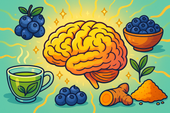
The Role of Antioxidants in Healing Brain Stress from Dissociation
Antioxidants protect the brain from the oxidative stress caused by trauma and dissociation. By neutralizing free radicals and supporting mitochondrial recovery, they help restore clarity, focus, and emotional balance — allowing the mind to heal at the cellular level 🌿🧠.
-
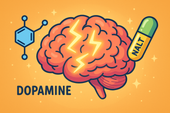
N-Acetyl L-Tyrosine (NALT) for Supporting Mental Clarity
N-Acetyl L-Tyrosine (NALT) fuels dopamine production — the neurotransmitter of focus and motivation. By supporting brain chemistry during stress, NALT helps restore mental clarity, energy, and alertness, making it easier to think clearly and feel present again ⚡🧠.
-

How Ginseng May Improve Focus and Energy in Dissociation
Ginseng helps combat the mental fatigue and fog that often come with dissociation. By supporting mitochondrial energy, balancing neurotransmitters, and regulating cortisol, it gently restores focus, motivation, and emotional presence — helping the mind reconnect with clarity and strength 🌿⚡.
-
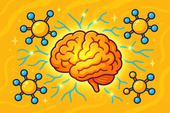
Phosphatidylserine and Dissociation: Supporting Cognitive Function
Phosphatidylserine helps calm the stress response by balancing cortisol, the body’s primary stress hormone. By lowering cortisol spikes, it protects memory, focus, and emotional stability — restoring clarity and mental presence for those struggling with dissociation 🧠🌿.
-
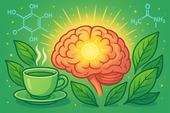
Can Green Tea Extract Help with Dissociative Brain Fog?
Green tea extract may help lift dissociative brain fog by supporting neurotransmitter balance, reducing inflammation, and enhancing energy at the cellular level. With its key compounds EGCG and L-theanine, it promotes calm focus, clarity, and emotional presence — helping you feel more alert and grounded 🍵🧠.
-
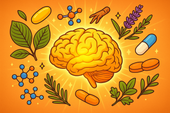
Building a Natural Supplement Stack for Dissociation Support
Building a supplement stack for dissociation means nourishing the brain and body back into communication. By supporting neurotransmitters, gut health, and energy balance through nutrients like magnesium, omega-3s, curcumin, and probiotics, you can help restore clarity, calm, and connection — one layer at a time 🌿🧠.
-

Chamomile and Lavender for Dissociative Anxiety Relief
Chamomile and lavender work together to calm dissociative anxiety by soothing the nervous system and restoring emotional safety. Their natural compounds balance cortisol, enhance GABA activity, and activate the vagus nerve — helping you feel grounded, connected, and at peace again 🌿💜.
-
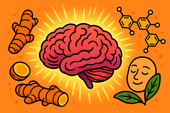
Curcumin for Inflammation and Mental Clarity in Dissociation
Curcumin, the golden compound in turmeric, does more than fight inflammation — it helps clear the mental fog often tied to dissociation. By calming neuroinflammation, balancing neurotransmitters, and supporting mitochondrial energy, curcumin can restore mental clarity, focus, and emotional presence 🌿🧠.
-
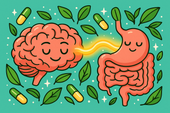
Probiotics and Dissociation: Exploring the Gut–Brain Axis
The gut–brain axis plays a vital role in emotional awareness and presence. When the microbiome is balanced, it supports serotonin production, vagus nerve activity, and calm focus. Probiotics help repair this connection — restoring safety, clarity, and the feeling of truly being in your body again 🌿🧠.
-
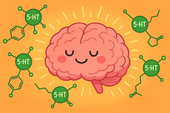
5-HTP for Dissociation: Supporting Serotonin and Emotional Stability
5-HTP helps bridge the gap between emotional numbness and stability by supporting serotonin production — the neurotransmitter that shapes mood, sleep, and sensory awareness. For people experiencing dissociation, 5-HTP may gently restore connection, presence, and emotional balance from the inside out 🌿🧠.
-
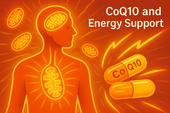
CoQ10 and Energy Support for People with Dissociation
Chronic dissociation often leaves the body running on empty — tired, foggy, and disconnected. CoQ10 helps recharge that system at the cellular level by restoring mitochondrial energy, reducing oxidative stress, and supporting the brain’s capacity to stay present. It’s energy medicine for both body and mind ⚡🧠.

















































